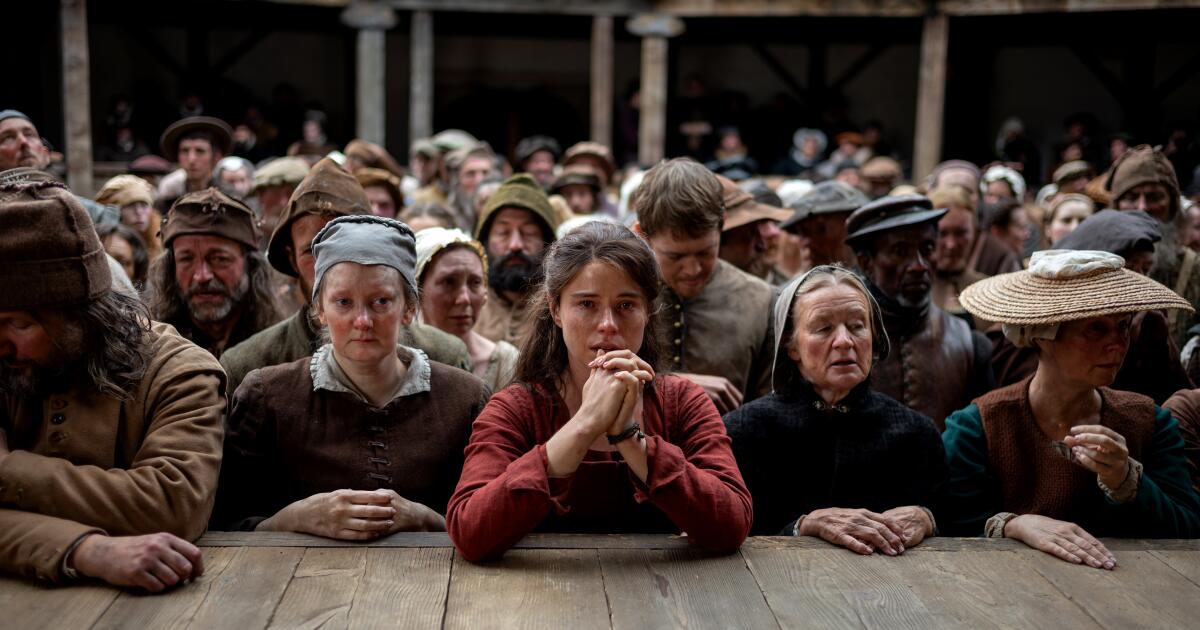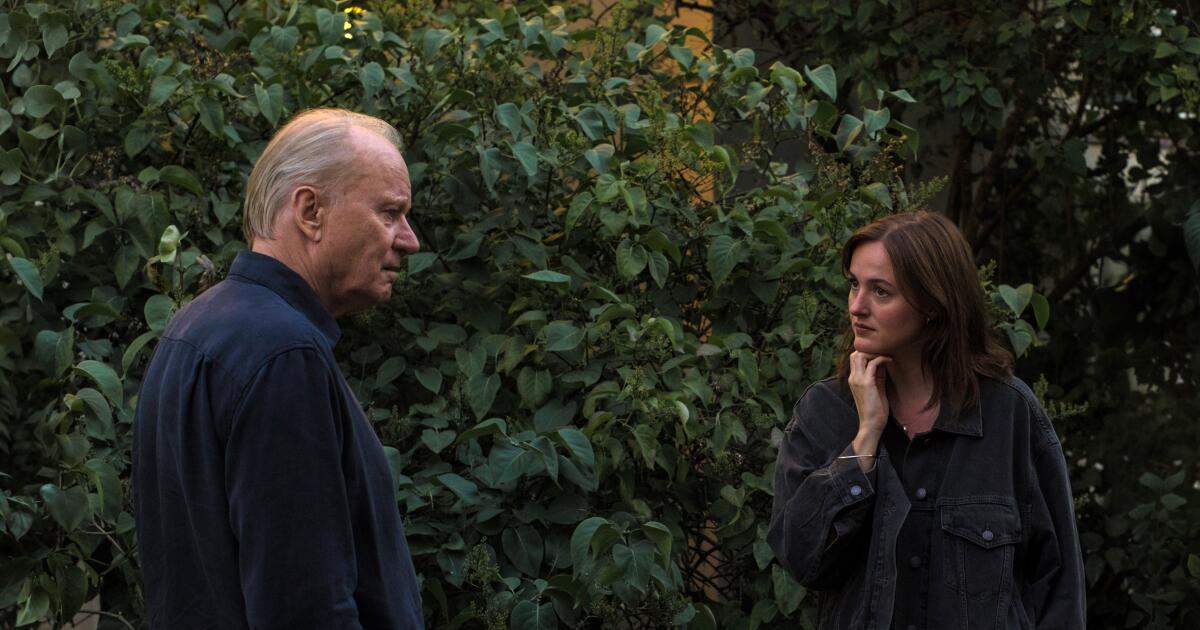‘Hamnet’ review: Jessie Buckley is witchy wife to Paul Mescal’s Shakespeare
William Shakespeare wouldn’t be wowed by this domestic drama about his home life back in Stratford-upon-Avon. Where’s the action? The wit? The wordplay?
The great playwright’s skill is hard to match. Instead, “Hamnet,” directed by Oscar winner Chloé Zhao (“Nomadland”), uses our curiosity about the Bard to spin a soggy story about love and grief with enough tears to flood the river Thames. Co-written by Zhao and Maggie O’Farrell, this tonally faithful adaptation of O’Farrell’s florid 2020 novel of the same name stars Paul Mescal as Will — the name he goes by here — and Jessie Buckley as his wife, Agnes, pronounced Ahn-yes, although the real person was more commonly called Anne Hathaway. The 16th century’s fondness for treating Agnes/Anne and Hamnet/Hamlet as interchangeable versions of the same name is part of the plot and must be endured.
The tale is set during the years that Will launched his career in London, missed being at the deathbed of one of his children and funneled his guilt and sorrow into theater’s most prestigious ghost story. Mostly, however, we’re stuck at home with Agnes, who spends half the film weeping.
“There are many different ways to cry,” wrote O’Farrell, whose book goes on to list several variations. (The novel is overripe with descriptors, rarely using one word when a paragraph will do.) Buckley’s wet and wild performance shows us each of them — “the sudden outpouring of tears, the deep racking sobs, the soundless and endless leaking of water from the eyes’’ — plus a few others I’ll call the disgorged caterwaul, the furious scrunch and the chuckle swallowed into a choke. “Hamnet” is my least favorite of Buckley’s showcase roles (I loved “The Lost Daughter”), but the dampness of it has pundits wagering she’ll finally get her Academy Award.
Christopher Marlowe truthers aside, William Shakespeare was an actual person who, historical records concur, married a pregnant woman eight years his senior and had three kids: Susanna, the eldest, and twins Judith and Hamnet. (They’re played, respectively, by Bodhi Rae Breathnach, Olivia Lynes and Jacobi Jupe.) Nearly everything else ever written about the family is conjecture spun from the scraps of information that exist, such as Shakespeare’s will leaving nothing to his wife other than “his second-best bed.”
Previous fictions have deemed Agnes a cradle robber or a shrew or the Bard’s secret co-writer. Zhao’s script goes one further: This Agnes is a witch. Not merely in the slanderous meaning, as in a difficult woman (although she’s also that). Buckley’s Agnes is actually magic. She can predict someone’s destiny by squeezing their hand, the party trick Christopher Walken did in “The Dead Zone.” Sometimes she’s wrong, sometimes she fights fate with everything she’s got, yet her faith in her foresight is rarely shaken. Her husband, who would later write witches and sorcerers and soothsayers into “Macbeth,” “The Tempest” and “Julius Caesar,” is taxed by her psychic gifts. He grumbles that it’s hard to open up to someone who can already “divine your secrets at a glance.”
Her ability to see through time and space has somehow made Agnes transparent too. Joy, confusion, fascination and despair take over her entire face instantaneously, turning Buckley’s performance into an acting exercise of being raw and present. (The crooked smile that signifies her unvarnished realness gets wearying.) The plotting doesn’t have any subterranean levels either, trusting solely in its primal display of sweat, hormones and heartbreak. This period piece almost seems to believe Agnes is inventing each emotion.
Will, a tutor, is trapped inside teaching Latin the first time he spots his future bride romping around in the grass with a hawk on her arm. Cinematographer Łukasz Żal frames the scene in a pane of window glass so that Agnes’ reflection ripples across Will’s yearning face, contrasting the earthy enchantress with the indoor bookworm. These oddballs have little in common besides their defiance of village norms and their families’ mutual disapproval. “I’d rather you went to sea than marry this wench,” Will’s mother, Mary (Emily Watson), hisses. (Her gradual thaw is genuinely affecting.)
Meanwhile, Agnes’ most supportive sibling, a farmer named Bartholomew (Joe Alwyn), can’t fathom what Will has to offer. “Why marry a pasty-faced scholar?” he asks. “What use is he?”
Their flirtation — especially Mescal’s dumb, happy, horny grin — makes Shakespeare feel freshly relatable. Perhaps his Ye Olde Tinder profile read: “Aspiring playwright seeks older woman, pagan preferred.” At times in “Hamnet,” 1582, the year of their marriage, could pass for a millennium earlier, a rustic era where neither has anything more pressing to do than canoodle under the trees. Later on, their partnership feels more contemporary, a frustrated writer hitting the bottle while his missus supports but doesn’t understand his work.
That the greatest dramatist of the last 500 years is married to someone wholly incurious about his art is, in itself, a tragedy. There’s a scene in which you wonder not only if has Agnes never seen one of his plays, but if she even knows what a play is. Our credulity would snap if Mescal’s Shakespeare was the slick talker that his early biographer John Aubrey described as “very good company, of a very redie and pleasant smoothe Witt.” But this stammering, rather dull chap doesn’t come across as a genius. He must save it all for his quill.
This isn’t Mescal’s fault. The book’s version of him is pretty much the same, perhaps because O’Farrell doesn’t reveal that this fictional grieving character is Shakespeare until the last page. (Although the title is a gimmicky clue.) At least Zhao adds scenes that show him workshopping his material. The kids prance around the yard quoting “Macbeth” a decade before he’ll stage it and Mescal gets to recite a “Hamlet” soliloquy as a little treat. I enjoyed the unremarked-upon tension of Will returning home from London with a hip haircut and an earring.
The texture of the film is impressive. Żal’s camera swivels around their home, soaking it in like a documentary. Whenever the film goes outside, he and Zhao make you feel the mystical power of the dirt and leaves. The forest rumbles with so much energy that it sounds like living next to a freeway. To keep things feeling authentic, co-editors Affonso Gonçalves and Zhao keep in flukes that other filmmakers might consider flubs, like an insect dive-bombing one of the actor’s eyelashes. The spell of “Hamnet’s” naturalism rarely breaks, save for a couple nice flourishes, like a shadow puppet depiction of the plague and a shot of the underworld as seen through a black lace curtain, a literalization of going beyond the veil.
Meanwhile, the score by the talented Max Richter is made of soft, pleasant little piano plinks and one major if beautiful mistake: a climactic needle-drop of his 2004 masterpiece “On the Nature of Daylight.” That soul-stirring number is one of the loveliest compositions of the modern era, so good at making an audience sigh that it’s been used two dozen times already, including in “Arrival,” “The Handmaid’s Tale,” “Shutter Island” and “The Last of Us.” As soon those violins kick up here, you’re shoved out of the 16th century and feel less moved than shamelessly manipulated.
“Hamnet’s” sweetest note is 12-year-old Jacobi Jupe playing the actual Hamnet. The script hangs on our immediate devotion to the boy and he stands up to the challenge. Unlike most child actors — and unlike his on-screen parents — he never overplays his big scenes. His stoicism is wrenching. Also terrific is his real-life older brother, Noah Jupe, as the play-within-a-film’s onstage Hamlet. In a rehearsal, this young actor seems dreadful. Zhao has him whiff it so that Mescal can say the lines again, louder. But on the play’s opening night, he’s a sensation.
Shakespeare didn’t invent “Hamlet” from whole cloth. He adapted it from a Norse yarn that had been around for centuries, and Lord knows if he was more inspired by his own child or by another successful version of “Hamlet” that played London a decade before. In our century, it’s been reworked for the screen more than 50 times, and mouthed by everyone from Ethan Hawke and Danny Devito to Shelley Long.
Yet I would have been happy watching the older Jupe do the whole thing again for this lively Globe Theatre crowd, the first to discover how Shakespeare’s version will end. As this Hamlet collapses, the audience reaches their arms toward the fallen prince. The actor draws strength from the groundlings and they, in turn, find solace in his pain. That stunning image alone single-handedly captures everything this movie has struggled to say (or sob) about the catharsis of art.
‘Hamnet’
Rated: PG-13, for thematic content, some strong sexuality and partial nudity
Running time: 2 hours, 5 minutes
Playing: In limited release Wednesday, Nov. 26

